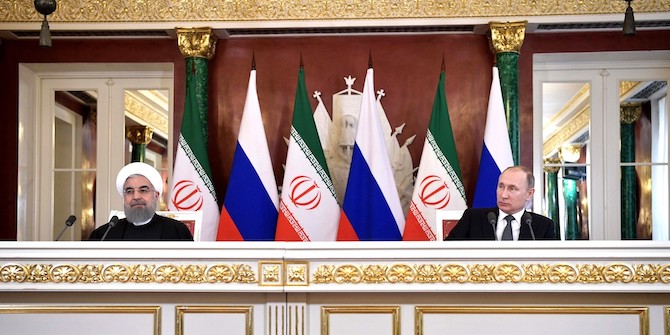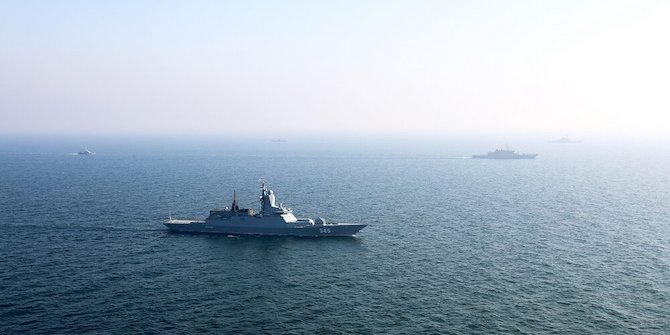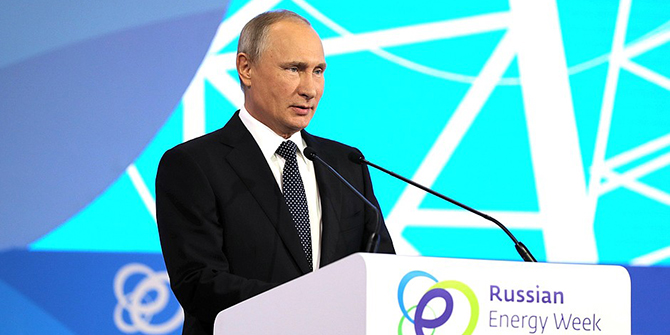by Ghoncheh Tazmini

On 1 April 2021, I had the pleasure of organising a closed online workshop, hosted by the LSE Middle East Centre, titled ‘The Russian-Iranian Partnership in the Middle East: Challenges and Opportunities’. The event brought together scholars and experts to examine different aspects of Russia and Iran’s policies in the Middle East, through a variety of specialisations, as well as to determine what Russian-Iranian alignment augurs for the future of the region. This theme is becoming more topical as Iran looks East -towards fostering non-Western alliance patterns and partnerships.
During the day-long workshop, scholars joined us from Estonia, the United Kingdom, Italy, Russia, the United States, Qatar and Germany, to examine three overlapping themes in three sessions. In the first session, ‘Drivers of Russian and Iranian Foreign Policy in the Middle East’, the panel explored the impetus behind Russia’s resurgence in the Middle East, and the key drivers behind Iran’s regional strategic doctrine. The primary goal of the session was to unpack Moscow and Tehran’s priorities in the region, taking into account both their converging interests and areas of tension. The second objective was to examine the role of perceptions, normative values, and ideational structures in shaping Russian and Iranian state preferences and patterns of cooperation.
The second session, ‘Russia and Iran in Iraq, Syria and Yemen’, examined Russian and Iranian priorities in Iraq, Syria and Yemen by mapping areas of cooperation and sources of tension between them. The dynamics in each arena are very different, as is the scope of Russian and Iranian engagement and their respective spheres of influence. Participants deliberated over the extent to which differing priorities or approaches impinge on the Russian-Iranian relationship.
In this session, speakers explored the impact of recent political developments on Moscow and Tehran’s partnership. With the lifting of the blockade and reconciliation efforts within the Gulf Cooperation Council (GCC), the panel addressed the prospects of closer ties between Iran and the GCC, and whether concrete steps could be taken to reduce security concerns on both sides. This session also considered whether Moscow, which presents itself as an arbiter that is on good terms with the region’s feuding powers, could help bridge the gap between Iran and its Arab neighbours. Finally, the panel reflected on whether Russia could act as a mediator in reviving the Joint Comprehensive Plan of Action, known as the Iran nuclear deal. Speakers also weighed up the implications of a possible improvement in relations between Tehran and Washington on the Russian-Iranian partnership.
In a robust and engaging discussion in three thought-provoking sessions, speakers and participants deliberated over these complex questions and themes. Panellists have contributed summaries of their fascinating presentations to the LSE Middle East Centre, which are featured in this blog series. The posts integrate some of the findings and insights that emerged from the workshop. Some broader conclusions will be compiled in a forthcoming publication for the LSE Middle East Centre Paper Series.
This is part of a series on the challenges and opportunities facing the Russian-Iranian partnership in the Middle East, based on contributions from participants in a closed LSE workshop in April 2021. Read the introduction here, and see the other pieces below.
In this series:
- The Russian-Iranian Partnership in the Middle East: Challenges and Opportunities by Ghoncheh Tazmini
- Russia’s Middle East Policy and View of the Post-Cold War Global Order by Viacheslav Morozov
- Drivers of Russia’s Middle East Policy by Diana Galeeva
- Russia and Iran’s Relations in Iraq by Arman Mahmoudian
- Russia and Iran in Syria: Military Allies or Competitive Partners? by Samuel Ramani
- The Post-Blockade Gulf: Prospects for Relations with Iran? The Russian Role by Courtney Freer
- Russia’s Role in Brokering a Comprehensive Agreement between the United States and Iran by Hamidreza Azizi
- Russia and the Issue of a New Security Architecture for the Persian Gulf by Nikolay Kozhanov





